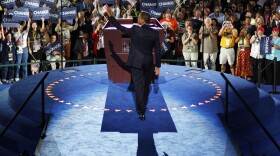At Wednesday's groundbreaking ceremony, President Obama said the new National Museum of African American History and Culture in Washington, D.C., would be not just a record of tragedy, but a celebration of life.
"It is on this spot — alongside the monuments to those who gave birth to this nation, and those who worked so hard to perfect it — that generations will remember the sometimes difficult, often inspirational, but always central role that African-Americans have played in the life of our country," he said.
Any president of any party would have spoken at the museum's groundbreaking. But the appearance Wednesday of the nation's first African-American president, in the midst of his re-election campaign, highlighted a shift in Obama's approach to African-American voters.
While Obama tried not to focus on race in his 2008 campaign, he has decided to make his outreach to the black community more targeted and aggressive this year, says George Mason University professor Michael Fauntroy.
"What he's got to do is some of the things that he's begun to do — and that is to speak more directly to African-Americans," Fauntroy says. "As we look toward the campaign, we are certainly seeing more of that ... being more sort of socially black, if you will."
Targeted Outreach
That statement may be controversial, but Fauntroy points to little things — like when the president sang a few bars of Al Green last month or "Sweet Home Chicago" with B.B. King at the White House on Tuesday night.
Some of this is just the president letting loose and having fun, but his campaign has a strategy. Earlier this month, Obama unveiled an initiative aimed at black voters.
"This month we're announcing the 2012 launch of African-Americans for Obama," he said in a video. "I don't think there's a better time than African-American History Month to consider the tremendous progress we've made through the sacrifices of so many."
African-Americans for Obama is part of the campaign's Operation Vote, which targets individual voting blocs, including Jews, Hispanics, gays and African-Americans.
"This campaign is powered by folks at every level, taking ownership where it matters most — around the kitchen table, in barber shops and beauty salons, in your faith community, at work or at school," Obama said.
Fauntroy says while this kind of targeted outreach may not have been necessary in 2008, it is today.
"History moves people, but it doesn't move people every time," he says. "You look at the economic downturn, the foreclosure crisis, and the just evisceration of black wealth around the country — you know there are a number of reasons why African-Americans would be less than excited to spend time concerning themselves with voting on Election Day, and he's got to overcome those things."
Concerns About Turnout
The president's approval rating among African-Americans hasn't budged — it's still in the 90s. But Fauntroy says what Obama has to worry about is turnout, particularly in states like North Carolina, Virginia and Florida, where a spike in African-American turnout put Obama over the top four years ago.
"It's not enough to get 95-96 percent of the black vote — he'll get that. The question is will the pie be the same size or larger?" Fauntroy says.
And so the president's message to African-American supporters is not too different from what he had to say Wednesday — as he compared the new National Museum of African American History and Culture to the other great institutions on the National Mall.
"Just like the Air and Space Museum challenges us to set our sights higher, or the Natural History Museum encourages us to look closer, or the Holocaust Museum calls us to fight persecution wherever we find it, this museum should inspire us as well," Obama said. "It should stand as proof that the most important things in life rarely come quickly or easily. It should remind us that although we have yet to reach the mountaintop, we cannot stop climbing."
Copyright 2021 NPR. To see more, visit https://www.npr.org.









